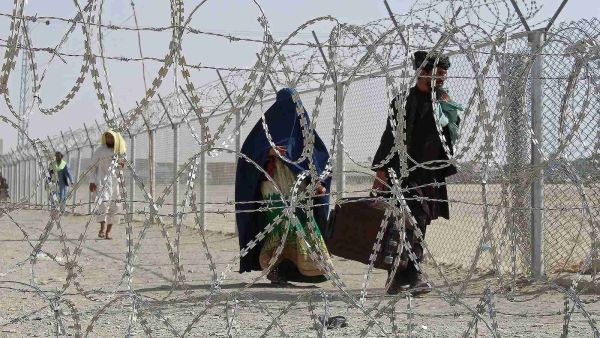The Afghan Taliban succeeded in establishing the Islamic Emirate in 1996. Pakistan was one of three countries that recognized the Taliban government in the 1990s, but severed official ties with it in 2001. For the past two decades, Pakistan has been a safe haven for Taliban leaders. So re-emergence of the Taliban in Afghanistan in the summer of 2021, and the rise of a friendly government in Kabul were described as a strategic victory for Pakistan.
The rising tensions between Pakistan and the Afghan Taliban https://t.co/fiMAqXdclx
— Elmseekho (@elmseekho) May 12, 2022
Pakistan has also made various efforts at the domestic, regional and international levels to further assist Afghanistan and even link various actors to the Taliban. In the last nine months, however, more signs of tension and conflict, such as several border clashes and rocket exchanges, have become more apparent. Pakistani airstrikes on April 17 and warnings to the Taliban came as Afghan Taliban officials also warned Pakistan and condemned the airstrikes. In the current situation, although Pakistan's relations with the Taliban have not reached a stage of widespread tension, there are broad factors involved in increasing the level of tension:
Main causes of tensions
Revival of Tehreek-e-Taliban Pakistan: Since August 2021, the activities of the Tehreek-e-Taliban Pakistan (TTP) have increased with attacks on Pakistani cities such as Quetta Balochistan and hundreds of other terrorist incidents. Also reorganizing the Pakistani Taliban (gathering 17 divided factions) and strengthening the central structure, expanding the movement to other ethnicities, continuing attacks on the Pakistani government's non-Islamic partners (especially China's interests), close ties with the East Turkestan Islamic Movement (ETIM) are all against the security and geopolitical interests of Pakistan.
The rising tensions between Pakistan and the Afghan Taliban
— Nasir Babajee (@BabajeeNasir) May 10, 2022
The Taliban did not fight a 20-year insurgency against the US and NATO to become Pakistan’s puppets.https://t.co/eD2Hj2pxYX
The rise of the Pakistani Taliban, with the strength of 5,000 to 10,000, and claims such as the establishment of an Islamic state similar to the Islamic Emirate of Afghanistan, the establishment of an independent state in Pakistan's tribal areas and controlling border areas are extremely dangerous for Pakistan.
In fact, the allegiance of Tehreek-e-Taliban Pakistan (TTP) leaders to the Afghan Taliban leader, equal education, Pashtun ethnic ties between the two groups, and the release of hundreds of Tehreek-e-Taliban Pakistan (TTP) members from Afghan prisons by the Taliban have been aspects of the two groups' cooperation. The Taliban have effectively given asylum to the TTP, and the TTP is using Afghanistan to increase cross-border attacks and send fighters to Pakistan.
While Islamabad sees growing support for full sovereignty in Pakistan as a threat to Pakistan's Talibanization, Kabul-based Taliban leaders do not think so. According to the United Nations, terrorist groups such as Jaish-e-Mohammed and Lashkar-e-Taiba, and Tehreek-e-Taliban Pakistan (TTP) have maintained training camps and personnel in some Afghan provinces. But in response, the Taliban have rejected it, insisting that they will not allow any terrorist group or organization to use Afghan territory against Pakistan.
#Opinion: The growing tensions between #Afghanistan and #Pakistan cannot be solely attributed to the Tehreek-i-Taliban Pakistan sanctuaries as border clashes are also souring relations between the two administrations.
— scroll.in (@scroll_in) April 28, 2022
Read more: https://t.co/36Xp5AP6EN pic.twitter.com/mC2SD1nI5Z
However, although there has been progressing in the compromise talks between the Pakistani government and the Tehreek-e-Taliban Pakistan (TTP) with the Afghan Taliban's mediator, the Tehreek-e-Taliban and the Pakistani government face wide-ranging challenges in disarmament, respect for the red lines and Pakistan's constitution, status of forces or border areas, peaceful settlement, dissolution of Pakistan Tehreek-e-Taliban, severance of ties with ISIS-k, and etc.
In fact, Islamabad is now pressuring the leaders of the Afghan Taliban to stop the Tehreek-e-Taliban Pakistan (TTP) and emphasizing the Taliban's inability to counter them, but Islamabad's expectations of the Afghan Taliban's intentions and capabilities are far from clear. This seems to be the most important cause of recent tensions in the past nine month’s relationship.
Stimulating separatism in Pakistan: The alliance between the Pakistani Taliban and other groups, will increase the danger of military cooperation and training the Baloch fighters and separatists, while Pakistan is facing a very negative impact of the sharp increase in Baloch attacks and insurgency in Balochistan and Gwadar.
https://t.co/dYfXYMCmGq
— Akasha singh (@Alpha640036471) April 28, 2022
The recent Pakistani airstrikes in Afghanistan to target alleged hideouts of the terrorist group Tehreek-i-Taliban Pakistan (TTP) has increased tensions between Islamab clashes in border areas of both the countries, writes Sergio Restelli for Inside Over.
Also, the Pakistani Taliban is trying to assist the liberation of ‘Free Balochistan’, ‘Free Pashtunistan’ and ‘Free Sindh’ on a national scale. Meanwhile, the Afghan Taliban have so far either refused or failed to act in line with Pakistan's demands and the widespread pursuit of secession from the anti-Pakistani Taliban in Afghanistan. This, something has contributed to the scope of divergence.
The Pashtunistan Challenge and the Durand Line: The Durand Line between the Pakistan-Afghanistan border covers an area of 2,560 km from north to south of Afghanistan. Pashtun nationalist circles are calling for the unification of the Pashtuns of the two countries and the great Pashtunistan. Islamabad considers the non-recognition of the current border line by Taliban as a violation of the territorial integrity of an important part of the country. But the Taliban's policy so far has been non-recognition of the Durand Line, and by opposing Pakistan's border fencing, it has also emphasized the implicit support of some Taliban officials for the Greater Pashtunistan demand.
Dispute over India's position in Afghanistan: Some in the Taliban appear dissatisfied with Islamabad's widespread influence and involvement in all of Afghanistan's internal affairs. Therefore, the Taliban want to reduce its dependence on Pakistan and, in consultation with various countries such as India, provide the ground for international recognition and gain leverage and balance against Pakistan. Many recent visits by Indian officials to Afghanistan also increase the possibility of opening an Indian embassy in Kabul and a diplomatic presence in Afghanistan. Pakistan, on the other hand, believes that the Pakistani Taliban is backed by India and sees the expansion of Indian influence in Afghanistan as a potential security threat.
Pakistan's foreign policy and identification of the Taliban: In the last nine months, there has been widespread pressure and demands from the Afghan Taliban to identify the Taliban (as the legitimate government in Afghanistan) in Islamabad. But Pakistan has willingly or unwillingly decided not to unilaterally recognize the new government in Kabul. In addition, this type of Islamabad’s action in consultation with various ethnic and political currents in Afghanistan can be seen as a means of putting pressure on the Taliban to moderate its behavior in line with the interests of Pakistan.
In fact, in Pakistan's current view, resolving the Afghan issue is political and inclusive, and contrary to the Taliban's interests, it has moved away from unilateral recognition of the Taliban. In another dimension as well, the largest number of cabinet ministers in the new Pakistani government is from the Pakistan Muslim League-Nawaz (PML-N) and the Pakistan People's Party. This type of coalition government has a different view of Afghanistan and has areas of divergence with the Pakistani Taliban.
In addition, the most worrying challenge for Pakistan is its sinking economy with declining growth rates, declining foreign capital and increasing dependence. In fact, the current administration must accelerate the United States to solve the economic problems of balanced development of foreign policy and relations with China. This requires cooperation with various actors in the Afghan case and is somewhat far removed from the demands of the Afghan Taliban.
Afghan Immigrants and the Water Issue: Pakistan's economic situation with more than 3 million Afghan refugees, while preventing a humanitarian crisis in Afghanistan and the dangerous consequences of a new wave of refugees moving to the border is important. In fact, Pakistan is trying to control the Taliban's behavior in a way that does not prevent further damage to Pakistan's interests. In addition, the Taliban seem to have tied their water policy to reducing Pakistan's water share and managing Islamabad's political behavior in its own interests, given the declining water levels of border rivers. This, in turn, provides the basis for the divergence of relations.
The future of relationships
What is clear is that Islamabad and the Taliban do not want their relationship to end, the Taliban are still the closest group to Pakistan in Afghanistan with no suitable alternative. But the presence of large-scale anti-Pakistani groups such as the Tehreek-e-Taliban Pakistan (TTP) in Afghanistan poses a significant threat to Pakistan's national security. Therefore, if the mediation of the Afghan Taliban is not effective, Pakistan will probably launch attacks and pressure on the Afghan Taliban.
Meanwhile, the Taliban leaders' ability to meet Pakistan's various political, security, economic and geopolitical demands does not seem to be very high, which will keep the potential for tension and divergence high. The Taliban, for example, do not appear willing to take meaningful action against the Tehreek-e-Taliban Pakistan (TTP) and may be able to help build a stronger ceasefire. Also, if Islamabad does not recognize the Taliban, the Taliban will not be willing to cooperate extensively with Pakistan.
Pakistan, meanwhile, may seek more leverage against the Taliban, marginalize anti-Pakistani leaders of the Taliban, suppress Taliban interests in Pakistan, strengthen ties with Taliban opponents (to control the Taliban), close border crossings, and reduce the desire for recognition, and diplomatic engagement with the Taliban and more counter-terrorism cooperation with Western partners in Afghanistan.







